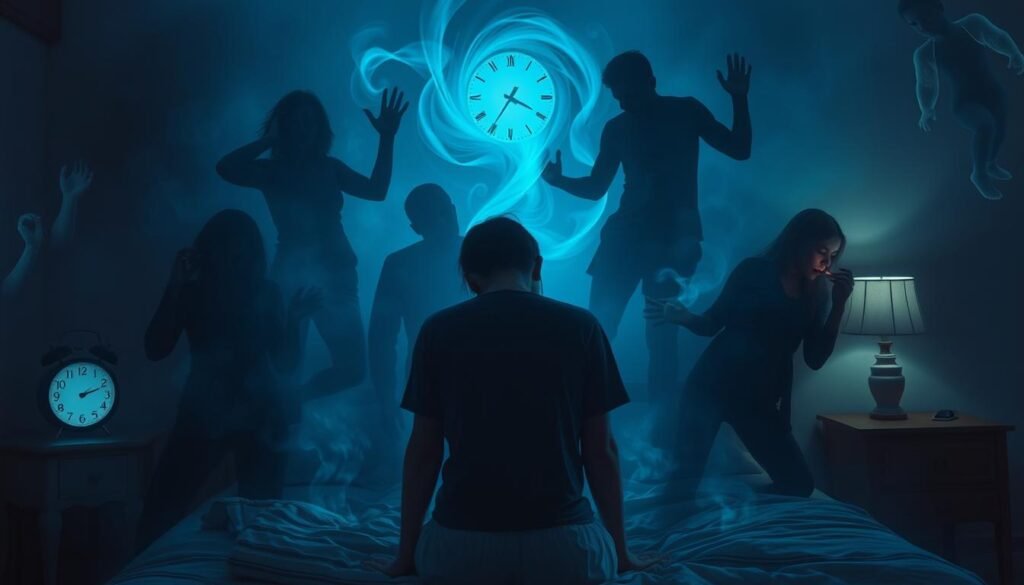About 30% of adults have trouble with insomnia. They find it hard to start or keep sleeping. Insomnia comes from many causes like stress, bad sleep habits, and health issues. These make sleeping well harder and affect your day-life by making you tired and less effective.
Heart disease, diabetes, and breathing problems are linked to insomnia. These conditions disturb your sleep a lot. If you have trouble sleeping, talk to a doctor. They can check your health and suggest how to sleep better. Learn more about what causes insomnia here.
Key Takeaways
- Insomnia affects about 30% of adults globally.
- Chronic medical conditions significantly exacerbate insomnia symptoms.
- Understanding insomnia causes can lead to better management strategies.
- A comprehensive evaluation by healthcare professionals is vital for effective treatment.
- Improving sleep can enhance overall health and quality of life.
Understanding Insomnia
Insomnia is a major sleep problem where it’s hard to fall or stay asleep. About 35% of adults struggle with it. It can make you very tired and lead to long-term health problems related to sleep. To truly understand insomnia, it helps to know what it is and its usual symptoms.
Definition of Insomnia
Insomnia means not getting enough good sleep to feel refreshed. It affects how you function during the day and your health. You might find it hard to fall asleep, wake up often, get up too early, or feel like you didn’t sleep well. Stress, daily habits, and ongoing health issues can cause insomnia.
Common Symptoms of Insomnia
Knowing the symptoms of insomnia is key to getting the right help. Some of these symptoms include:
- Difficulty falling asleep at night
- Frequent awakenings
- Waking too early and not being able to go back to sleep
- Daytime fatigue or sleepiness
- Irritability or mood disturbances
- Difficulty focusing or concentrating
These issues can seriously affect how well you live your life. They might also be linked to other health problems, including mental health. In fact, around 40% of people with insomnia also have mental health issues.
Types of Insomnia
It’s crucial to know about the different types of insomnia for managing it well. There are mainly two types: acute and chronic insomnia. Each affects people in unique ways.
Acute Insomnia
Acute insomnia is a short-term issue, often lasting under three months. It can come from stress or major life changes like losing a job or dealing with trauma. Women tend to experience it more. The symptoms include:
- Lying awake for a long time before falling asleep
- Feeling restless during the night
- Waking up too early and being unable to return to sleep
Typically, acute insomnia gets better on its own once the stressful situation improves. However, it can greatly affect daily activities, causing tiredness and trouble focusing.
Chronic Insomnia
On the other hand, chronic insomnia lasts for three months or more. Those with this condition have trouble sleeping at least three nights a week. It can really impact a person’s health and often ties back to continuous stress, mood issues, or long-term health conditions. The symptoms include:
- Difficulty falling asleep at the night’s start (sleep onset insomnia)
- Waking up during the night and having trouble falling back asleep (sleep maintenance insomnia)
- Waking up too early and being unable to return to sleep (terminal insomnia)
Studies indicate women are more prone to chronic insomnia than men, especially as they age. This type of insomnia can also lead to anxiety and depression, making it a complex issue for mental health.

| Type of Insomnia | Duration | Common Symptoms | Prevalence |
|---|---|---|---|
| Acute Insomnia | Less than 3 months | Difficulty falling asleep, restless nights | More common in women |
| Chronic Insomnia | 3 months or longer | Sleep onset, sleep maintenance, terminal insomnia | Higher prevalence in women and older adults |
Chronic Illnesses and Medical Conditions Contributing to Insomnia
Chronic illnesses are closely linked to insomnia. They disrupt sleep patterns. Understanding how these illnesses affect sleep is key for addressing sleep troubles.
Heart Disease
Heart disease triggers stress and anxiety, making sleep difficult. This stress leads to poor sleep quality. As heart health gets worse, sleep problems can increase, creating a difficult cycle.
Diabetes
Diabetes affects sleep by causing blood sugar levels to go up and down. This can wake you up or make you uncomfortable at night. The challenge of managing diabetes also adds to sleep issues, harming your health.
Respiratory Issues
Conditions like asthma or sleep apnea cause trouble breathing at night. This leads to waking up often. Managing these conditions is crucial for better sleep.

The Connection Between Chronic Illnesses and Sleep Problems
Chronic conditions deeply impact sleep, leading to issues like insomnia. This link between chronic illnesses and sleep problems is clear, supported by many studies. Understanding this connection helps in improving the health of those with chronic diseases.
How Chronic Conditions Affect Sleep Patterns
Chronic illnesses mess with sleep in several ways. They disrupt our natural sleep cycles and can make us feel more stressed or anxious. For example, people with heart disease or diabetes might find it hard to fall asleep. Arthritis can cause pain that makes it hard to stay asleep. Many with chronic conditions suffer from insomnia, worsening their health over time.
The Bidirectional Relationship of Insomnia and Chronic Illnesses
Insomnia and chronic illnesses have a two-way relationship. Insomnia can make chronic conditions worse and even cause new health issues. Mental health disorders, for instance, are often linked with high rates of insomnia. This can make their conditions even worse. Addressing sleep problems is crucial in managing chronic diseases for better health.
| Chronic Condition | Impact on Sleep | Resulting Issues |
|---|---|---|
| Heart Disease | Obstructive sleep apnea, frequent awakenings | Daytime sleepiness, reduced quality of life |
| Diabetes | Restless legs, nocturia | Insomnia, worsening blood sugar control |
| Arthritis | Sleep disturbances due to pain | Increased fatigue, diminished physical function |
| Mental Health Disorders | Difficulty falling asleep, anxiety at night | Worsening mood disorders, exacerbated mental health issues |
| Fibromyalgia | Abnormal sleep patterns, alpha-delta sleep | Persistent fatigue, increased sensitivity to pain |
Common Chronic Illnesses Disrupting Sleep Patterns
Chronic illnesses reduce sleep quality, leading to a cycle of discomfort and poor sleep. Different conditions can majorly change how well we sleep. Knowing how these illnesses affect sleep is key to better care and handling.
Arthritis
Arthritis causes pain, especially at night. This makes finding a good sleeping position hard, causing one to wake up often. The constant pain makes insomnia worse, disturbing sleep further. People with arthritis often struggle to sleep well because of pain.
Mental Health Disorders
Stress, anxiety, and depression often go hand in hand with sleeping problems. Insomnia and mental health issues have a complex relationship. For those with mental health problems, insomnia can be a major issue. Dealing with these mental health issues can help improve sleep, making proper care essential.
Gastroesophageal Reflux Disease (GERD)
GERD causes acid reflux at night, which can ruin sleep. For many with GERD, lying down makes symptoms worse, disrupting rest. It’s another chronic illness that messes with sleep, showing the need for good nighttime management.

Knowing how these illnesses impact sleep can lead to improved sleep habits. Treating these conditions can vastly better sleep quality for sufferers. For extra details, check out the link here.
Insomnia Risk Factors from Chronic Diseases
Insomnia can come from many chronic diseases. Its factors vary with age and gender. Knowing these can pinpoint who might struggle more with sleep issues.
Age and Gender Differences
Insomnia risk factors from chronic diseases show up differently across ages and genders. Women are more likely to face insomnia than men. This is often due to hormonal changes during significant life stages.
Older adults also have a higher chance of insomnia. This is because of health issues and sleep pattern changes. About half of the people over 60 deal with insomnia symptoms. This shows how crucial it is to consider age and gender differences in insomnia.
Comorbid Conditions
Insomnia often goes hand in hand with other health problems. Conditions like diabetes and heart disease can make sleep worse. This can lead to a vicious circle where sleep problems and illness symptoms worsen each other.
Mood disorders such as anxiety and depression also play a role. They make people more likely to suffer from insomnia. Understanding these connections is key in finding the right treatment.
| Factor | Impact on Insomnia |
|---|---|
| Age | Higher prevalence of insomnia in older adults due to health changes |
| Gender | Women are twice as likely to experience insomnia |
| Chronic Illness | Diseases like diabetes and heart disease exacerbate sleep issues |
| Mood Disorders | Anxiety and depression contribute to insomnia risk |
| Socioeconomic Status | Lower status is linked to higher insomnia rates |
Medical Conditions Linked to Sleep Disturbances
Understanding how certain medical conditions affect sleep is key. Sleep apnea and restless legs syndrome are two major disruptors of normal sleep. Addressing these can greatly improve one’s health.
Sleep Apnea
Sleep apnea causes breath to stop and start while asleep, leading to many wake-ups. This condition makes people very sleepy during the day and links to serious health issues like obesity and heart problems. Those with sleep apnea might not know they have it, as it happens during sleep. Proper sleep routines and treatments such as CPAP machines help manage it. Sleep apnea’s connection to chronic diseases raises concerns.
Restless Legs Syndrome
Restless legs syndrome involves an irresistible need to move the legs, especially when resting or at night. This can make it hard to fall asleep and might cause insomnia. Several things might cause it, like low iron levels, certain medicines, or other health conditions. People with this syndrome often feel uncomfortable at night, leading to bad sleep and tiredness during the day. Dealing with any underlying health problems and changing some lifestyle habits can help.
| Condition | Symptoms | Treatment Options |
|---|---|---|
| Sleep Apnea | Interrupted breathing, loud snoring, daytime sleepiness | CPAP therapy, lifestyle changes, medical intervention |
| Restless Legs Syndrome | Uncontrollable leg movements, discomfort, nighttime aggravation | Lifestyle adjustments, iron supplementation, medications |
Tackling medical issues that disrupt sleep is essential for better sleep and health. For more about how sleep is affected, the Centers for Disease Control and Prevention offers excellent information.
Managing Insomnia with Chronic Health Conditions
It’s critical to tackle insomnia when you have chronic health conditions. Using medicines for insomnia along with lifestyle changes helps improve sleep. While drugs can help, combining them with behavioral methods ensures lasting results.
Medications for Insomnia
There are several medications available for those dealing with chronic insomnia. Some common ones are:
| Medication Name | Brand Names | Type |
|---|---|---|
| Eszopiclone | Lunesta | Non-benzodiazepine |
| Temazepam | Restoril | Benzodiazepine |
| Zolpidem tartrate | Ambien, Ambien CR, Edluar | Non-benzodiazepine |
But, doctors warn against using these medications for too long because of side effects. Cognitive behavioral therapy (CBT-I) is a recommended first choice. It’s often better than drugs.
Lifestyle Changes that Enhance Sleep Quality
Making lifestyle adjustments can drastically improve insomnia management. Here are key tips:
- Maintain a consistent sleep schedule by going to bed and waking up at the same time each day.
- Stay active during the day to promote better sleep at night.
- Limit caffeine, alcohol, and nicotine intake, especially in the hours leading up to bedtime.
- Create a relaxing bedtime routine to signal the body that it’s time to wind down.
- Consider alternative therapies like melatonin, yoga, or meditation to complement traditional methods.
Taking these active steps can help manage insomnia. This leads to better health and wellness.
Conclusion
Insomnia greatly affects life quality, especially for people with chronic illnesses. Studies show around 10% to 20% of people in the US and Western Europe have chronic insomnia. This issue is even higher in those with diseases like rheumatoid arthritis and fibromyalgia. Knowing how chronic health problems and sleep issues interact is key to effective treatment. Insomnia makes existing health problems worse and reduces well-being.
Treating insomnia in people with chronic illnesses requires special plans. For example, those with knee osteoarthritis often have trouble staying asleep. People with gastroesophageal reflux disease (GERD) also find their sleep disturbed at night. Addressing both the mental and physical aspects of sleep can improve outcomes. The American Academy of Sleep Medicine suggests using customized, evidence-based plans to help manage insomnia.
It’s important to see how chronic illnesses and insomnia are linked. The COVID-19 pandemic has made sleep problems more common. Knowing how to manage insomnia is more crucial than ever. Educating both patients and healthcare workers about treatments and lifestyle changes can help. These steps can lead to better sleep, healthier lives, and stronger coping methods for chronic conditions. For more details on managing insomnia linked to chronic conditions, check out this resource.